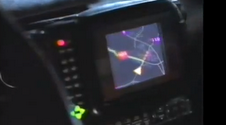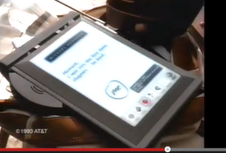Touchscreens, GPS and Tablets, From 20 Years Ago So Futuristic to Today So Routine
WASHINGTON, February 6, 2013 – While combing the internet to wax nostalgic via old commercials from my childhood, I made my way through memories of nerf-guns and ninja turtles toys. Along the way I discovered an AT&T commercial from 1993 entitled “View of the Future.” The commercial features what we
WASHINGTON, February 6, 2013 – While combing the internet to wax nostalgic via old commercials from my childhood, I made my way through memories of nerf-guns and ninja turtles toys. Along the way I discovered an AT&T commercial from 1993 entitled “View of the Future.”
The commercial features what were once wild-eyed and futuristic elements: “Have you ever borrowed a book from thousands of miles away? Have you ever crossed the country without stopping for directions? Have you ever sent someone a fax from the beach?”
The commercial highlights then-seemingly futurist technologies such as touch screens, tablets and GPS navigation. At the close of the commercial, AT&T promises its customers that some day, “you will.”
In 2013, tablets, GPS, touch-screens and wireless communications are foundations of how our daily life operates. Just two decades later, how did some of these innovations come to be?
Touchscreens
The dawn of the touch screen can be traced to E.A. Johnson of England’s Royal Radar Establishment. Touchscreens were used by air traffic controllers for decades. A modernized version of this technology began appearing in classrooms at the University of

Illinois in the early 1970s, in which students could answer questions via a computer.
Eleven years later, the TactaPad is invented. This device measures weight and finger impressions via a camera. In 2007 Apple released the iPhone, having perfected the touch screen technology they had begun to tinkering with in 1987.In 1987, Apple introduced the Desktop Bus, a track pad attached to a computer that would transmit touch movement onto a screen. In 1994, shortly after the release of the commercial, the Simon cellphone by IBM was released. This phone featured a mini tablet that allowed users to view electronic mail, facsimiles and receive and send phone calls.
Global Positioning Systems
In the late 1950s and early 1960s, the United States Navy began to track satellites and other large devices through satellite tracking frequencies. This military technology was crucial in a ship’s ability to track submarines and incoming enemy presence.

The term Global Positioning System does not enter the lexicon until 1973. This system used by the United States military does not truly enter the domestic discourse until the early 1980s, when South Korean Air Lines Flight 007 was shot down after mistakenly passing through Soviet airspace. Though many car manufacturers dabbled with navigation systems in the 1980s and 1990s. the first proper GPS navigation system appears in the 1995 Oldsmobile under the name Guidestar.
In 2000, before leaving office, President Bill Clinton signed a directive permitting navigation software available for wide commercial use without interruption from the military.
Tablets
Tablet based technology had long been a dream of many science fiction novels and films, specifically within the 1968 film 2001: A Space Odyssey. One of the first commercially available tablets, as we know them today, came on the market in 1993. The EO (similar in design to the tablet in the commercial) was an AT&T product competing at that time against the Apple Newton MessagePad, also released in 1993.

In 2001, Microsoft developed their tablet personal computer, integrating the typical Windows software. Throughout the decade, each year saw companies continue to modify and add to the tablet. The genre didn’t fully take off unto Apple re-entered the market with its launch of the iPad in 2010, creating a new standard that quickly overtook the NetBook concept of small laptop computer.The MessagePad for Apple’s Newton platform was a battery-operated device, with software capable of taking notes, itemizing lists and calendars. This device and many other early tablets operated with a stylus. In 1999 the Intel Web Tablet successfully integrated wireless communications to the tablet world.








Member discussion